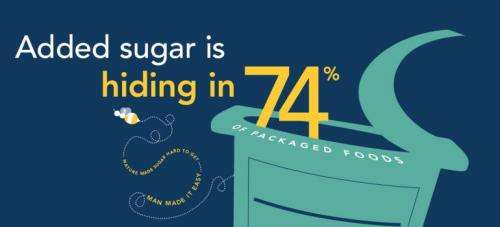The hidden costs of sugar

Americans today consume nearly three times the recommended amount of sugar every day. That's an average of 66 pounds of added sugar per year.
A growing body of science suggests that all this sugar isn't just making us fat; it may also be making us sick. That's one of many conclusions of SugarScience, an educational initiative and a comprehensive review of more than 8,000 scientific papers studying added sugar and its impact on health.
"It's already, from my perspective, a public health crisis," said Kirsten Bibbins-Domingo, MD, PhD, director of the UCSF Center for Vulnerable Populations at San Francisco General Hospital and Trauma Center, and member of the SugarScience team. "To see geriatric issues in kids, like diabetes, is extremely alarming. The numbers are staggering: 10 years ago, one out of 10 teens had pre-diabetes; right now, one out of four teenagers have pre-diabetes."
The goal of the national education initiative is to bring this scientific research out of the medical journals and to the public in an empowering way In addition to the team of UCSF, UC Davis and Emory University School of Medicine health scientists, SugarScience is partnering with outreach programs in health departments across the country.
"There really is a lack of an objective, authoritative voice on what the science actually is," said Bibbins-Domingo. "The goal behind SugarScience is to get this information out to the public, and we hope people can act on the information in the way that seems most appropriate to them."
In addition to links between sugar and chronic disease, such as diabetes and heart disease, physicians also are seeing new diseases they previously didn't have a name for, and hadn't seen in children, including Non-Alcoholic Fatty Liver Disease. This is a disease of the liver similar to what is seen in alcoholics, and, if left unchecked, it can progress into cirrhosis of the liver.
That's because liver processes sugar – specifically fructose – very similar to alcohol.
"The fastest rising cause of liver transplantation in Americans is Non-Alcoholic Fatty Liver Disease," said Laura Schmidt, PhD, a professor in the UCSF School of Medicine and lead researcher on the project. "You don't see changes like that in such a short period without a major change in environment."
A big part of that change is sugar consumption. Sugar is hidden in 74 percent of processed foods, including innocuous-seeming products like ketchup and salad dressing, according to research identified through SugarScience.
"It used to be a condiment, now it's a diet staple," said Robert Lustig, MD, MSL, a pediatric endocrinologist at UCSF Benioff Children's Hospital San Francisco and a member of the SugarScience team.
"As pediatricians, we had evidence of the connection between sugar and diabetes, heart disease and liver disease for years, but we haven't had this level of definitive scientific evidence to back up our concerns," said Lustig.
Despite the overwhelming negative findings associated with sugar consumption, the good news is that the knowledge can empower people to change their habits. The most important step, the scientists said, is understanding how much we eat, as well as where in our diet that sugar comes from.
Bibbins-Domingo noted that just reducing one's intake of sugary drinks alone – such as energy drinks and soda – would cut out 25 pounds of sugar annually for the average American.
"What we hope is that people will use the information to make their own changes in their diet, and to think about that for their families," she said.
More information about how to spot hidden added sugars, the latest sugar research and resource kits to share with schools or churches or community centers are all available at SugarScience.org.
More information: www.sugarscience.org/














